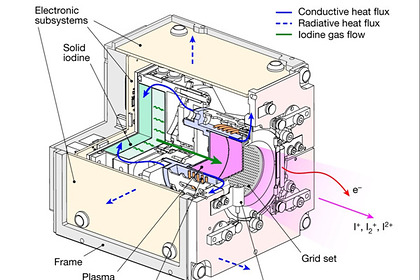French specialists have tested an iodine engine in low-earth orbit 
A team of French researchers has developed and first tested a near-earth ion engine which uses iodine as propellant. The article was published in the journal Nature.
Electric rocket motors currently used in satellites create thrust using electricity to accelerate the ions of a propellant gas – most often xenon. However, it is found on Earth in small quantities, requires expensive production and storage under pressure. Iodine can be a possible alternative to it – it is cheaper and more widespread, it can be stored in solid form.
Experts from the French company ThrustMe have developed a power plant on iodine and installed it on the CubeSat satellite, which was launched by the Chinese Changzheng rocket -6 “in November 2020 into a sun-synchronous orbit at an altitude of 480 kilometers above the Earth. In total, until March 2021, 11 test engine launches were carried out in space, lasting 80-90 minutes. Iodine proved to be not only a competitive fuel, the researchers note, but also demonstrated a higher degree of ionization than xenon.
According to the researchers, the test results will help accelerate the introduction of alternative sources of rocket fuel by the space industry. Iodine makes it possible to miniaturize and simplify the motor systems, they emphasize.